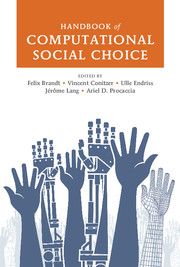Foreword
Published online by Cambridge University Press: 05 May 2016
Summary
Axiomatics and algorithmics are two methodologies at the forefront of modern mathematics. The latter goes back to the very birth of mathematics, whereas the former was not developed until Hilbert's famous contributions in the late 1800s.
Yet the axiomatic approach was the first to appear in modern social sciences, through the instant success in 1951 of K. Arrow's Social Choice and Individual Values. Beyond the negative, discouraging message of its famous (im)possibility theorem, that book had an immensely positive influence on the development of mathematical economics. It opened the way to the critical evaluation of actual democratic institutions through the filter of “self-evident” normative principles. Conversely, it allowed us to define “optimal” rules for collective decision making and/or the allocation of scarce resources by the convergence of a collection of such principles. In short, it started the field of mechanism design.
Cake division is probably the first instance of an economic model with an algorithmic twist. The mathematical statement of the problem goes back to B. Knaster and H. Steinhaus in the 1940s: it combines the normative choice of fairness axioms with the algorithmic concern for a protocol made of simple “cut and choose” operations. This literature did not have noticeable influence on the exponential development of mechanism design in the last 40 years, in part because it was developed mostly by mathematicians. Computational social choice will, I believe, bring it out from its relative obscurity.
In less than two decades, the COMSOC community has generated an intense dialogue between economists working on the normative side of mechanism design and computer scientists poised to test the computational complexity of these mechanisms. A remarkable side product of this collaboration is clear from the choice of the 19 thorough chapters. Under a common axiomatic and computational umbrella, they discuss
• the social choice problem of selecting a public outcome from the conflicting opinions of the citizens
• the microeconomic problem of dividing private commodities fairly and efficiently when individual preferences differ
• the market design problem of (bilaterally) matching employees to firms, students to schools, and so on
• the design of reputation indices and ranking methods in peer-to-peer systems such as the Internet
• the formation and stability of “local public goods,” that is, (hedonic) coalitions of agents with common interests
The relative weights of these problems are naturally quite unequal, but the point is their coexistence.
- Type
- Chapter
- Information
- Handbook of Computational Social Choice , pp. xi - xiiPublisher: Cambridge University PressPrint publication year: 2016



